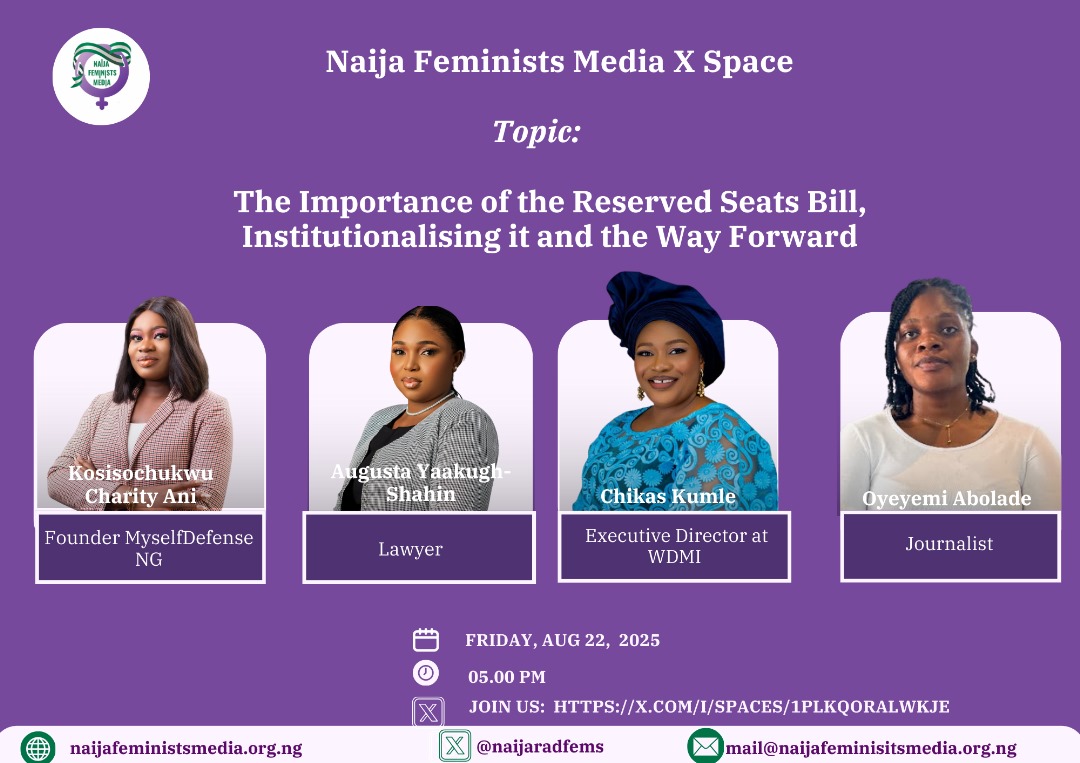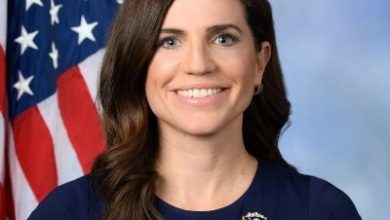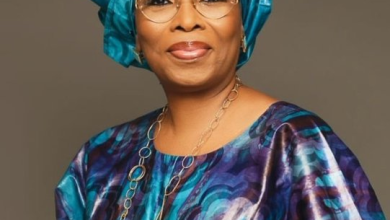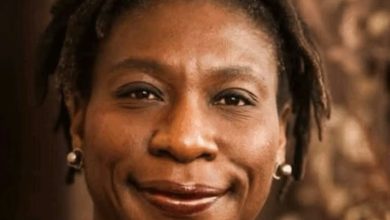
|
Getting your Trinity Audio player ready...
|
On August 22, 2025, at 5:00 p.m. (WAT), Naija Feminists Media convened an engaging X Space discussion titled “The Importance of the Reserved Seats Bill, Institutionalising It, and the Way Forward.”
The panel featured Kosisochukwu Charity Ani, feminist and Founder of MyselfDefense NG, and Chikas Kumle, politician and head of the Women Development Monitoring Initiative. It also included Augusta Yaakugh-Shahin, lawyer and leader of Lex Initiative for Rights, Advocacy, and Development, as well as journalist Oyeyemi Abolade.
The Space attracted nearly 100 participants and was moderated by Naija Feminists Media Executive Assistant, Joy Funmilola Oke.
Kicking off the conversation, Kosisochukwu Ani explained that the Reserved Seats Bill seeks to amend Nigeria’s constitution to guarantee a certain number of parliamentary seats exclusively for women. She emphasised that this provision is not a form of “pampering or special treatment,” but rather a deliberate attempt to build inclusivity, diversity, and leadership pathways for women in Nigerian politics.
“These reserved seats would guarantee women a political space and an opportunity to compete more equally in governance”, she said.
Kosisochukwu explained that the bill would help dismantle harmful stereotypes, strengthen democracy, and ensure women are not sidelined in decision-making processes. According to her, the bill is aimed at promoting equity not privilege by creating a level playing field for women in politics.
Citing examples such as the recent clash between the First Lady and Senator Dino Melaye, as well as Senator Natasha, she emphasised that the bill promotes gender equality and gives men the chance to recognise women as equals in the political space.
Speaking next, Chikas Kumle described the bill as a “game changer” capable of transforming Nigeria’s political landscape, noting that It will address the core problem of the gross underrepresentation of women in the parliament. She explained that women encounter major financial, cultural, and structural barriers when trying to run for office.
By institutionalising reserved seats, the bill would break those barriers, create opportunities for young women, and build public trust in governance.
Chikas stressed that this is not a “women’s issue” alone but a national one that strengthens democracy for all. She further called for massive awareness campaigns, more women-led organisations, reforms in political parties, and concrete accountability measures to ensure that women who occupy reserved seats are genuinely representative and effective.
Oyeyemi Abolade offered a journalist’s perspective, sharing the importance of the media in shaping public perception of the reserved seat bill. She noted that using everyday language to share information about the Reserved Seats Bill can help raise awareness and that the media should break it down in simple terms for better understanding.
Oyeyemi also stressed that it is the media’s duty to challenge stereotypes that portray women as weak, emotional, or unfit for leadership, and instead highlight their strength, competence, and impact in governance. She called on journalists to go beyond reporting and actively correct misinformation that undermines women’s political participation in Nigeria.
Providing a legal critique, Augusta Yaakugh-Shahin described the bill as a form of “constitutional surgery” that could produce unintended consequences. While acknowledging its potential to open space for women, she cautioned that it risks entrenching patronage politics or creating tokenism if not properly implemented.
“If we are opening the constitution, use that rare point to rewire incentive and not to add a side wing”, she said.
Augusta suggested alternative measures to support women in politics, including reserved candidacy slots, women’s campaign funds, and guaranteed media access. She also emphasised the need for stronger legal protections against political violence and harassment.
She concluded that while the bill has merits, it may not address the root causes of exclusion, and reforms must also target party structures and electoral systems.
The X Space revealed both enthusiasm and caution around the Reserved Seats Bill. All speakers agreed on the urgent need for women’s full and equal participation in governance, not as a privilege or concession, but as a democratic right.






